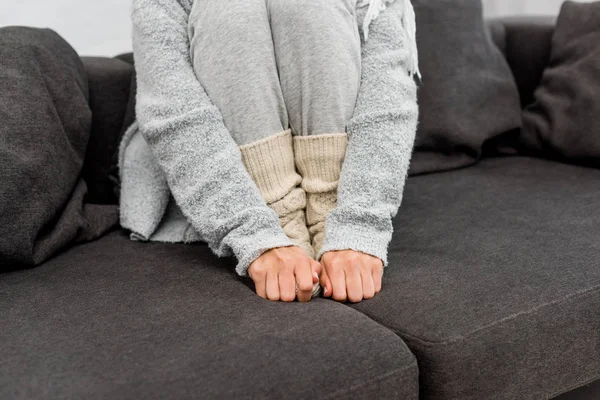Why Are My Feet Always Cold? Cold feet aren’t just an occasional annoyance—they can actually be your body’s way of telling you something’s off. Whether it’s a lifestyle habit or an underlying health condition, constantly chilly toes deserve some attention. If you’ve been wondering why your feet always feel like ice blocks, don’t worry—you’re not alone. Let’s break down the common causes, simple remedies, and when it’s time to call in the professionals.

Why Are My Feet Always Cold? 5 Common Causes
Our experts say cold extremities are frequently caused by one (or more) of these underlying conditions:
1. Poor Circulation
If your feet are always cold, poor circulation is often the first thing to consider. When blood flow to your extremities is limited, your feet don’t get enough warmth to stay cozy. This can happen for a few reasons:
- Sitting for long periods (hello, desk jobs!)
- Smoking, which narrows blood vessels and restricts circulation
- Heart conditions that make it harder for your blood to pump efficiently
If your lifestyle involves a lot of sitting or you’re a smoker, this could be the culprit behind those frosty toes.
2. Anemia
Iron-deficiency anemia happens when your body doesn’t have enough red blood cells to carry oxygen to all its parts—including your feet. Without enough oxygen-rich blood, your feet can feel perpetually cold. Severe anemia can make this even more noticeable and uncomfortable.
3. Diabetes
Diabetes is another common reason for cold feet. High blood sugar levels can damage nerves (a condition called peripheral neuropathy) or reduce circulation, both of which can leave your feet feeling icy. You might also notice numbness or tingling along with the cold sensation—two signs that shouldn’t be ignored.
4. Hypothyroidism
An underactive thyroid slows down your metabolism, which means less heat is produced in your body overall. This sluggishness can lead to poor circulation and leave your hands and feet feeling like they’re stuck in the freezer, no matter how many layers you wear.
5. Raynaud’s Phenomenon
Raynaud’s phenomenon is a condition where the blood vessels in your fingers and toes overreact to cold temperatures or stress, temporarily cutting off blood flow. This can cause your toes to turn white or blue and feel icy cold until circulation returns to normal. It’s often triggered by something as simple as stepping outside on a chilly day or holding a cold drink.
How to Treat Feet That Are Always Cold
The good news? If there’s no serious medical issue behind your cold feet, there are plenty of natural ways to warm them up and improve circulation.
1. Get Moving
Staying active is one of the simplest ways to boost blood flow and keep your feet warm. Try taking short walks throughout the day, practicing yoga, or even doing some light stretching while watching TV. Movement gets your heart pumping and helps deliver warm, oxygen-rich blood all the way down to your toes.
2. Warm Them Up Directly
Sometimes the quickest fix is the most obvious one: warm them up! Slip on a pair of thermal socks or invest in some cozy slippers for around the house. A heating pad or warm foot soak can also work wonders—just make sure not to overdo it if you have reduced sensation in your feet (like with diabetes). And whatever you do, avoid walking barefoot on cold floors—it’s like asking for chilly toes!
3. Eat Foods That Support Circulation
Your diet plays a bigger role than you might think when it comes to keeping warm. Load up on iron-rich foods like spinach, lentils, and lean meats to combat anemia-related cold feet. Omega-3 fatty acids (found in salmon and walnuts) are also great for improving circulation, while green tea may help relax blood vessels for better blood flow.
4. Give Your Feet Some Love
A quick foot massage isn’t just relaxing—it’s great for improving circulation too! Use gentle pressure to stimulate blood flow and pair it with elevating your feet above heart level for extra benefits (this helps gravity send blood back toward your heart). Bonus: it feels amazing after a long day!
5. Kick the Smoking Habit
If you’re a smoker, quitting could be one of the best things you do—not just for your overall health but also for warming up those frosty toes! Smoking constricts blood vessels and reduces circulation, so saying goodbye to cigarettes could mean hello to toastier feet.
When to See a Doctor About Cold Feet
While it’s normal for feet to get cold every now and then—especially during colder months—persistent or severe symptoms might point to something more serious that requires medical attention.
When It’s Time to Call Your Doctor:
- You notice numbness, tingling, or pain along with cold feet
- Your skin changes color (turning blue or pale)
- You have slow-healing wounds on your feet or toes
- You experience cramping or pain in your legs while walking (a potential sign of peripheral artery disease)
A doctor can run tests like blood work or imaging studies to figure out what’s going on—whether it’s related to diabetes complications, thyroid issues, anemia, or something else entirely.
Final Thoughts
Cold feet might seem like a small inconvenience, but they can reveal important clues about what’s happening inside your body. From poor circulation and anemia to diabetes and thyroid problems, understanding the underlying cause is key to finding relief.
The good news? There are plenty of ways to treat cold feet naturally—whether that means moving more, eating better, or simply investing in cozier socks! And if the problem persists or worsens over time, don’t hesitate to reach out to a healthcare professional.
After all, taking care of your circulation doesn’t just warm up your toes—it keeps you healthier from head to toe!
Also Read | High Morning Blood Sugar: Understanding and Managing the Dawn Phenomenon






